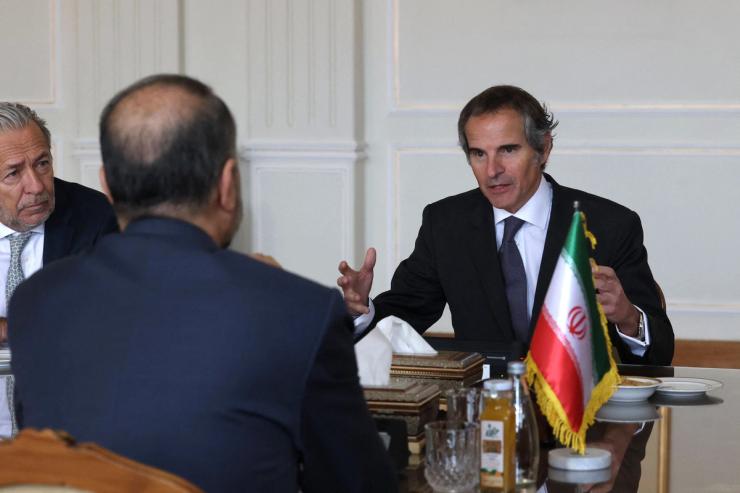The News
In a surprise move, Iran has cut its stockpile of near-weapons-grade uranium over the past few months, the International Atomic Energy Agency (IAEA) said in a report, but continued expanding a nuclear program Tehran has maintained is for civilian purposes.
The move to dilute its stockpile of 60% enriched uranium could ease fears of a direct confrontation between the Islamic Republic and Washington as Israel’s war in Gaza has grown into a broader regional conflict.
The drop marked the first time Tehran has cut its stockpile of near-bomb-grade uranium, which it started producing in 2021. The move was detailed in a confidential report by the UN’s nuclear watchdog obtained by The Wall Street Journal and other outlets.
In a separate report, the IAEA stated that Iran continues to obstruct an investigation into uranium particles detected at undeclared locations. Iran is the only state without nuclear weapons that produces 60% enriched uranium.
“Until Iran provides technically credible explanations” for its nuclear activities, inspectors “will not be able to confirm the correctness and completeness of Iran’s declarations,” the IAEA’s Director General Rafael Grossi told diplomats, Bloomberg reported.
Iran’s top nuclear official has invited Grossi to Iran in May to “remove misunderstandings and expand cooperation,” he told the state-owned Islamic Republic News Agency.
SIGNALS
Iran can still produce enough weapons-grade uranium for a bomb in a week
If Iran were to turn its 60% enriched uranium into 90% weapons-grade uranium, it could produce enough to make a nuclear weapon within a week, a report from the Institute for Science and International Security said this month. However, even with enough highly-enriched uranium, Iran would have a long way to go to produce a weapon and be sure it works, according to Gregory Brew, an Iran analyst at the Eurasia Group. “Doing any of this without detection is essentially impossible,” he wrote on X. One nuclear expert told the Associated Press that Iran would likely need “a year or more” to build a reliable nuclear bomb.
Does the war in Gaza make a nuclear Iran more likely?
Experts are divided on how the war in Gaza might be shaping Iran’s nuclear ambitions. Tehran may conclude that its current strategy is working, because it has largely avoided paying the price for attacks carried out by its allies such as the Houthis in Yemen, Shia militias in Iraq, and Hezbollah in Iraq, the Iran researcher Danny Citrinowicz wrote for the Atlantic Council. “Iran may even think that its conventional deterrence — together with a robust nuclear program — is enough, and that there is no point in crossing the nuclear Rubicon,” Citrinowicz wrote.
By contrast, Ali Vaez of the International Crisis Group argued that the war in Gaza makes a nuclear Iran more likely. So far, Iran has relied on proxies to defend its territory and attack U.S. or Israeli forces, its declared enemies, and appears unwilling or unable to join an all-out war.
“The overall message is clear: Iran can cause chaos, but it is not strong enough to go on a real offensive,” Vaez wrote in Foreign Affairs, adding that this may lead Tehran to conclude that the conflict “has made it look weaker rather than stronger” – and to rush towards building a nuclear weapon as a deterrent. Doing so would have risks, but “might provide Iran with the kind of immunity North Korea and Russia have enjoyed as they confront the West,” Vaez wrote.



